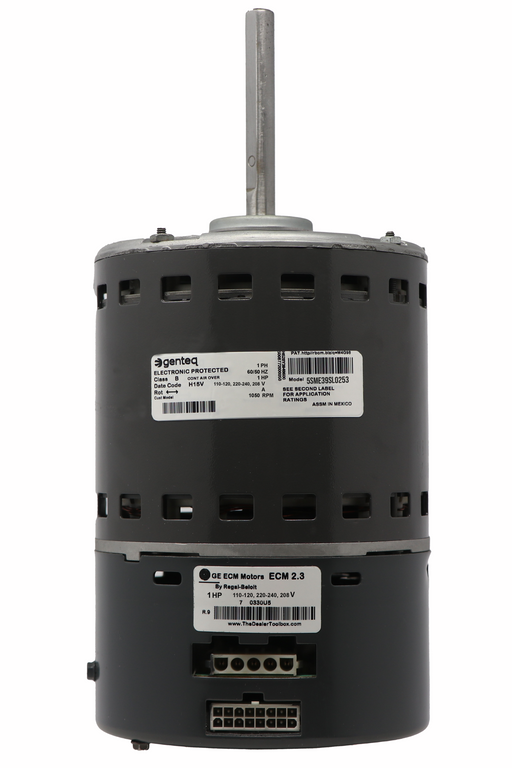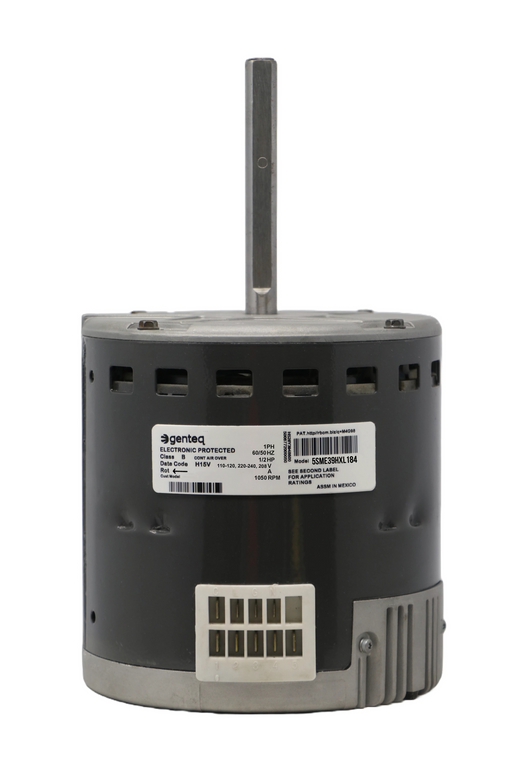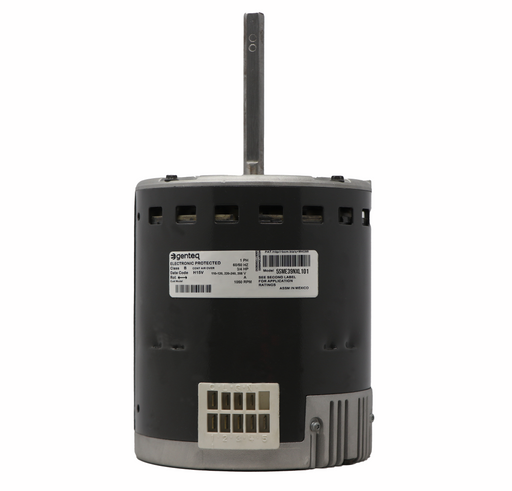(813) 440-8108

Troubleshooting Your HVAC Blower Motor: Common Issues and Solutions
An HVAC blower motor is an essential component of your heating and cooling system, responsible for circulating air throughout your home. When the blower motor malfunctions, it can lead to uncomfortable temperatures and reduced air quality. If your HVAC blower motor is not working, understanding the common issues that can cause this is crucial for timely repairs and maintaining a comfortable living environment.
In this article, we'll explore the various reasons why your HVAC blower motor might not be working, including electrical issues, mechanical failures, and maintenance problems. We'll also provide practical troubleshooting tips and solutions to help you address these issues effectively.
👉🏻 Read More: How to Test HVAC Blower Motor with a Multimeter: A Comprehensive Guide
Common Issues with HVAC Blower Motors
1. Electrical Problems
One of the most frequent causes of a malfunctioning blower motor is electrical issues. These can include blown fuses, tripped circuit breakers, or faulty wiring. Check your home's electrical panel for any tripped breakers or blown fuses and reset or replace them as needed. If the problem persists, it could be due to loose or damaged wiring within the HVAC system.
2. Capacitor Failure
The capacitor is a small device that stores and releases electrical energy to start the blower motor. Over time, capacitors can wear out or fail, preventing the motor from starting. If you hear a clicking sound or the motor hums without starting, the capacitor might be the issue. Replacing a faulty capacitor usually resolves this problem.
How to Identify Blower Motor Issues
Blower Motor Capacitor
Capacitors are crucial for starting the blower motor. Signs of a bad capacitor include the motor not starting at all, a humming noise when the motor tries to start, or the motor running intermittently. You can test the capacitor with a multimeter set to the capacitance setting. If the reading is significantly lower than the rating on the capacitor, it needs to be replaced.
Remanufactured Motor by United HVAC Motors
2 Year Replacement Warranty (Terms Apply)
Plug n Play - 100% Programmed
Match your Motor Model N...
Remanufactured Motor by United HVAC Motors
2 Year Replacement Warranty (Terms Apply)
Plug n Play - 100% Programmed
Match your Motor Model N...
5SME39SL0253 GE Genteq Blower Motor ECM 2.3 1 HP
5SME39HXL184 GE Genteq Blower Motor ECM X13 1/2 HP
Blower Motor Relay
The blower motor relay is responsible for switching the blower motor on and off. If your blower motor doesn't start, it could be due to a faulty relay. Symptoms of a bad relay include the blower motor not turning on at all or running continuously without shutting off. Test the relay for continuity with a multimeter. If it doesn't show continuity when activated, replace it.
Blower Motor Resistor
The blower motor resistor controls the motor speed. If your blower motor only works at certain speeds or not at all, the resistor might be the culprit. Visually inspect the resistor for any signs of burns or damage. Testing it with a multimeter can confirm if it needs to be replaced.
Blower Motor Bearings
Worn or damaged bearings can cause the blower motor to operate noisily or seize up completely. If you hear grinding or squealing noises, it's likely due to bad bearings. Inspect the bearings for any visible damage or excessive wear. Lubricating the bearings can temporarily fix the issue, but replacement is usually necessary for a long-term solution.
Blower Motor Not Working on High Speed
If your blower motor works at lower speeds but not at high speed, the problem could be related to the motor's speed control. This issue might be caused by a faulty relay or a failing resistor in the blower motor control module. Inspect these components for any visible damage or signs of wear. Replacing the defective parts should restore high-speed functionality.
Blower Motor Not Working with Heat
When the blower motor fails to operate when the heat is on, it may indicate a problem with the heating system's controls. This could be due to a malfunctioning limit switch, a faulty thermostat, or issues with the furnace's control board. Checking and testing these components can help identify the source of the problem. Repair or replace any defective parts to ensure the blower motor works correctly with the heating system.
Blower Motor Not Working with AC
If the blower motor isn't functioning when the air conditioning is on, the issue might be related to the AC controls. This can include problems with the thermostat, the control board, or the contactor in the AC unit. Ensure that the thermostat is set to the correct temperature and mode, and check the control board and contactor for any signs of damage or failure. Replacing these components can resolve the issue.
👉🏻 Read More: How to Clean HVAC Blower Motor
Advanced Troubleshooting Steps
1. Inspecting the Blower Motor Relay
The blower motor relay is responsible for switching the blower motor on and off. A faulty relay can prevent the blower motor from operating. Using a multimeter, test the relay for continuity. If the relay is defective, replacing it should restore the blower motor's functionality.
2. Testing the Blower Motor Resistor
The blower motor resistor controls the speed of the motor. A failing resistor can result in the blower motor only working at certain speeds or not at all. Inspect the resistor for any signs of damage or overheating. Testing the resistor with a multimeter can confirm if it needs to be replaced.
3. Evaluating the Blower Motor Control Module
Modern HVAC systems use a control module to manage the blower motor's operation. A malfunctioning control module can cause the blower motor to stop working. Check the module for any error codes or diagnostic lights that can indicate a problem. If the control module is faulty, it will need to be replaced by a professional technician.
4. Checking for Obstructed Airflow
Ensure that all air registers and vents are open and unobstructed. Blocked airflow can cause the blower motor to overheat and shut down. Regularly clean and maintain the air registers and ducts to ensure proper airflow and prevent overheating issues.
Frequently Asked Questions
Why is my HVAC blower motor not working?
There are several potential reasons, including electrical issues, capacitor failure, motor overheating, and mechanical failures. Troubleshooting these areas can help identify the problem.
Can I replace the blower motor myself?
While some minor repairs and maintenance tasks can be done by homeowners, replacing the blower motor often requires professional expertise to ensure it's done correctly and safely.
How often should I replace my HVAC air filters?
It's recommended to check and replace HVAC air filters every 1-3 months, depending on usage and the type of filter. This helps maintain proper airflow and system efficiency.
👉🏻 Read More: ECM Motor vs. Variable Speed Motor: Understanding the Differences
Conclusion
Dealing with an HVAC blower motor that isn't working can be frustrating, but understanding the common causes and solutions can help you troubleshoot the problem effectively. Regular maintenance, such as checking electrical connections, replacing air filters, and inspecting mechanical components, can prevent many of these issues. If you're still experiencing problems, don't hesitate to contact a professional for assistance.
Maintaining your HVAC system ensures a comfortable and healthy living environment. Check out our website for a range of remanufactured blower motors that might solve your HVAC problems and keep your system running efficiently.
5SME39NXL101 GE Genteq Blower Motor ECM X13 3/4 HP
Remanufactured Motor by United HVAC Motors 2 Year Replacement Warranty (Terms Apply) Plug n Play - 100% Programmed Match your Motor Model N...
View full details5SME39SXL224 GE Genteq Blower Motor ECM X13 1 HP
Remanufactured Motor by United HVAC Motors 2 Year Replacement Warranty (Terms Apply) Plug n Play - 100% Programmed Match your Motor Model N...
View full details





